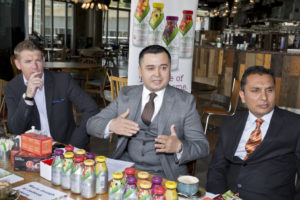The Catering News ME Forum met once again last month, with a team of recruitment specialists, including F&B Directors and HR Managers, to discuss the matter of finding suitable employees, recruiting them, and retaining them.
Rikhsibay: Of course you need new blood but we need more focus on motivating and retaining staff.
Alban: Most of us have and use our in-house websites and I’m sure most of us use catererglobal.com, as our main source, but now LinkedIn is the trend and whenever we have an opening we post a link on Linked to our site and that network is working fast.
Justin: The smartphone has to be the biggest revolution – over the last 5 years we have rethought recruitment and social media is a big part of that.
Max: Social networking is marvellous but sometimes you get bombarded with rubbish. As an independent we look at many channels and our best staff are from recommendations from other known performing staff.
Bhavesh: Skype can be good but it can also be a bit challenging when recruiting chefs, as they need to be hands on. We have to see them physically doing the challenges, and take our recommendations from the tutors.
How do you go about staff recruitment and what tools do you use in terms of technology or partners?
Maria
We have not actively focused on retention for the last couple of year but we have increased employees a lot. Today we are doing most recruitment online, and in newspapers. Online has helped tremendously, with many people applying through our websites. We also take staff through employee referrals, through cousins and villages, as well as going out to setup meetings. We also have agents working with us in various countries and they find the candidates and do the screening for us before we fly in to take the final decision.
Alban
Most of us have and use our in-house websites and I’m sure most of us use catererglobal.com, as our main source, but now LinkedIn is the trend and whenever we have an opening we post a link on Linked to our site and that network is working fast.
Bhavesh
We use LinkedIn, together with our online recruitment and our careers page on our website, and we also do succession planning internally in the Jumeirah group to give the opportunity to grow within the company. We also organise recruitment trips to variouscountries – like Spain, Kazakhstan, and the Philippines.
Alban
To get staff is not hard but getting the right staff is a challenge. As Marriott we are global so it’s easier. We believe in cross exposure – cross training from other countries, and we give them preference. LinkedIn is definitely a success for sure.
Justin
The smartphone has to be the biggest revolution – over the last 5 years we have rethought recruitment and social media is a big part of that. Traditional recruitment strategies, like– high cost of flights –agencies, etc, are alleviated a lot with social media. We also hit bigger crowds and with the right forums and hashtags you get suitable people. LinkedIn offers 600 applicants in a few minutes.
Max
Social networking is marvellous but sometimes you get bombarded with rubbish. As anindependent we look at many channels and our best staff are from recommendations from other known performing staff. I’ve seen some great CVs but that doesn’t say they can perform or deliver. Wethen do Skype interviews before considering to fly anyone out here.
Nicholas
With 21 restaurants we get out a lot more than some, to see other restaurants and what they are doing. We try to associate ourselves with those bringing in European workers, as opposed to Sri Lankan or Filipino, not to poach their staff but instead we have found that after 6-7 months they are often keen to move on and having made contact they approach us. We also use tools available to us to measure the ability of our staff, such as the predictive index – a questionnaire of working personality. This is time consuming but it helps us decide the right people for the job.
Bhavesh
Skype can be good but it can also be a bit challenging when recruiting chefs, as they need to be hands on. We have to see them physically doing the challenges, and take our recommendations from the tutors.
Nicholas
There are certain areas in the hotel where we need to employ certain nationalities. Such as people from KenyaSri Lanka or Pakistan can work outside in the heat, whereas people fromRussia,Kazakhstan, the Philippines and Chinese don’t want the heat or the tan. We lose a lot of staff from not liking the heat and being place incorrectly.
Alban
For some positions we must invite the candidate to the hotel, like with a chef for tasting, but for lower grades we can just do skype. The main challenge we face is always looking for English speaking, which can be difficult from the Asian side. On Skype they can good English speakers but in Dubai not the same.
Bhavesh
It’s no longer practical to fly in junior staff for interviews –we have to work off recommendations. Some hotels also do incentive programmes, whereby if they recommend someone who stays for six months or more they get a reward for bringing talent to the company – that works extremely well.
Rikhsibay
With Dubai being such a tourism hub we no longer need to look outside the country, there are so many hotels and restaurants here with good staff– so today there is a lot of crossover of staff and staff targeting or head hunting.
What are the key challenges in staff recruitment?
Maria
The key challenge is finding the right person for the position
Max
There are also often budget restraints as the financial packages can be restrictive.
Bhavesh
We find that the senior positions are a lot easier to fill because of the benefits of the package offered – our challenge is in recruiting the junior staff, where salaries are a lot more competitive. There is always someone willing to pay AED100 more. Language is also a key challenge – getting the right language skills – especially here in an expat country.
Max
People have preconceived ideas that Dubai will earn them a lot of money, and we have to explainthat it’s something you must earn through hard work – especially with English people. They assume they will work into a highly paid position straight away and the reality is that doesn’t happen.
Nicholas
We are in the process of recruiting head barmen, to increase our service aspect in the bars – so we have gone to many differentrestaurants and bars to find the salary norm, and we have found that many are throwing a whole package at staff. They offer an AED7000 package for accommodation and salary and we would normally pay AED1500-2000 inclusive of accommodation, so to attract really good barmen is very hard.Also, when you offer AED7000-8000 other staff look around and ask why getting more and we need to be careful of how we look after staff.
Bhavish
People from EU countries don’t want to stay in shared accommodation or the hotel this is challenging as it is traditionally part of the salary. We’ve had lot of declines because they don’t want hotel accommodation.
Max
As an independent we can give allowance for accommodation, our staff accommodation is a stepping stone until they find where they want to live.
Justin
I don’t talk money on Skype. My main problem is the process from CV to employment being at least three months. The turnaround is my biggest issue – it screws my whole operation. Nobody can sit on a buffer of ten guys.
With Dubai a transit city do you suffer from staff retention and how do you counter it?
Bhavish
With more and more hotels opening the demand is increasing but the talent is not there. To get the talent you have to pay a premium.
Maria
Five years back we could give 60-90 day handover but now we only have 30 days so it’s really difficult in transition.
Rikhsibay
In a hotel you have regular guests and instead of looking after them you market for new guests. But staff are the same – you must look after them, give them career progress and vision of the company. Of course you need new blood but we need more focus on motivating and retaining staff.
Alban
Yes, we need the right person for the right job but how long are we willing to wait for the right person. Do you just fill gap with not the right person or wait out.
Justin
We have a football club mentality – great clubs have 3-4 years of glory then lose players and start again. They have junior academies and they accept that they won’thit goals as they build a team feeding the bottom up. Ultimately, they know they will get 1-2 years out of star players at peak.
I’ve not been in region a long time but when arrived I was told turnover is healthy and I don’t agree. I agree with taking a comi chef or waiter and developing them with a succession plan. I also send potential bar tenderers to global hotels for training; I invest in people. I don’t talk money I talk life goals – I always ask ‘what do you want to be when you grow up?’. If they want to be a GM then I’ll put together a progression plan.
Bhavish
The reality is that only 20% want to be GM and the rest are here just for money. I offer progression plan, performance appraisal, LPP, and they simply ask how much service they will get that month.
Justin
You are hiring the wrong guys. No matter how old they are, the first question I ask is what do you want to do and how you want to grow – if they say I just want to cut chicken I don’t hire. I drill in my interviews that I am not hiring for skill, that’s not important as it can be taught, I hire for attitude…The skilled should teach. We pay good money for the right staff and it’s their responsibility to train and educate their team.
I get guys from countries that are hungry to grow and so, money becomes irrelevant. I have three guys working under me, and I know they each want my job and that’s right – each should gun for the next level
Alban
Reality is for 50 dirhams staff will leave – there is no loyalty here. We do all the right things like cross training and development, but bottom line is the money.
Max
Our key challenge we face is staff poaching. It’s very difficult to keep staff when they are promised pay rise. We had three European front of house staff members that stayed less than 2 weeks. We have one particular HR manager, without naming names, who comes in here all the time promisingmy staff greener grass.
Justin
If you offered me double my salary I’d go, but if you offered me AED1000 more I’d tell you were to go. I say if they want to leave for AED200 stay another year and work under a Michelin-trained chef in an award winning hotel, and get the experience and accolades and when you leave you’ll get AED4000 more. Learn your trade and instead of going elsewhere we will send you to London to grow and then you’ll be worth AED10,000 more. We need to get in their heads that we are a training ground.
Bhavish
But you are talking only about 10% of your staff that you can offer this too.
Justin
I’m not, I’m talking about 100% of the right people I employ, who have the desire. Not hiring off pieces of paper or through agencies but talking to them and finding what’s important to them. Within Starwood my percentage of staff moving into Dubai is very high and that’s because Europe is on its knees and everyone things the streets are lined with gold here. London is beginning to pick up, but the difference is that nobody is moving in London, exec chefs from London are locked in – there is no movement or growth like here, so when I bring them here they see there is growth and development.
Alban
It depends on the nationality. I had one junior leave because of AED100 more to send money home to feed kids – they don’t care about succession plan. What can I do?
Justin
I can hire European students, from Italy and Spain, to earn the same salary as Nepalese, why, because there are no opportunities at home and they know there is career development here.
Rikhsibay
On a personal note, I recently went to Kazakhstan and found that the most important thing for us was to explain the vision of the hotel before we did any recruitment. I took one guy, he had a single page CV, nothing stood out on paper, but when I chatted to him I felt he was the right fit for our family orientated hotel. He told me he played guitar for a hobby. He came with 40 new recruits and outshone them all. Later I learnt he was the number two guitar player in the whole of Kazakhstan. So, it’s not about a 5 page CV but seeing someone is a good fit for your hotel. Also, people may leave for a higher salary but they often come back when they realise that the grass wasn’t greener.
Nicholas
Coming from a single hotel our succession plans cannot be as wide as those from a global chain like Starwoods, we can’t offer the same opportunities to move staff around.
Alban
Sometimes it not about the salary or the package, but the work environment. I know others offer higher packages but what is their life and work balance?My staff are happy as they get time with their families also.
Justin
It’s not hotels poaching my staff, I have to accept that I am a training ground for Etihad and the hospitals, because they can offer double salary and all expenses and I can’t compete, but to rival hotels I don’t lose guys. If it’s a career progression I will push them because in two years’ time they will come back more skilled.
Are salaries and package requirements increasing and is this in-line?
Nicholas
We use buyout labour to help our staff increase their salaries, so if we run a big event staff are invited to fill the gaps with skills sets they don’t use daily, such as lifeguards becoming water staff. We have a lot of functions and so it’s up to them if they want higher salaries.
Rikhsibay
There are no stable salary packages – here there are too many competitors so packages can’t align. There are many other things to attach to a salary package to make it comfortable.
Justin
Who doesn’t want more money?I want more money and there is only one way to get that and it’s to grow and develop myself. Staff can jump around for a few bucks for years but it’s no serious improvement. You are best staying put and learning and the pay rise will be better.Money must be earned not given.
Alban
Nevertheless, we all run annual employee satisfaction surveys, and wherever I have worked there was always a low score on question of money. This is why it’s difficult to retain.
Rikhsibay
We must empower up and down level – give everyone a level of power to make decisions. Put a system in place, trust people, and empower them and that keeps them happy.
Bhavish
We must incentivise our workers – help them achieve what they need. Everyone befits from staff to guests. But the questions of what type of incentive is tricky – it should not be just regarding money.
Nicholas
One thing we did was that when we noticed we were selling around 14 bottle of Moet on the beach every day, we saw an opportunity to sell more, and to do this we offered AED50 to everyone that sold a bottle and our sales shot up to 200 bottles each day.
Bhavish
We incentivise our restaurant team with offers like foreign trips or complimentary steak dinners. This drives the whole team.
Nicholas
We run a premier league to incentive each restaurant in terms ofwine or food sales, and at end of the year the winner gets a prize.
Rikhsibay
In recruitment, I say don’t talk about salary first, talk about benefits – ask what is in it for me in two years’ time. In interview I look at person as if they were my boss in two years’ time and how the interaction would be.
Max
Incentive not just about money – our employee of the month can win an iPad or have the weekend off and get a brunch – we mix it u and make it fun. I leave it to supervisors to decide how to incentivise, but last month they encouraged the floor staff to get the perfect order and one of them won a burger at end of the night. This makes the evening more fun to work, sales increase and so does staff satisfaction.
Bhavish
We do the same, and during the Michael Bublé concert we said that if any cashier sold more than AED30,000they would get a night stay in the hotel and we ended up rewarding 8 people throughout that concert, while creating a buzz in the team.
Is it important for you to have equality across your international employees in terms of pay and conditions?
Max
Everyone around this table is from a different country, so Nationality doesn’t matter so long as they can do the job.
Bhavish
Ten years back used to say different countries get different salary because of different cost at home. But that is now changing and that is the way forward. They are here now so salary home is not relevant.
Rikhsibay
Different nationalities are very important here because of the pattern of tourism. I speak to a lot of guests, from around the world, and those from developed countries say the service level is much better here, because the nationality matches the client. One nationality doesn’t offerdiversity.
How important is it for you to offer in house training and what programmes are in place?
Max
We haverecruitment training and ongoing tests. We also clump the tips and service charge together and they must do test every month on the menu and restaurant, and if we see staff need extra training we can shadow with more experienced staff. We look at training case by case.
Rikhsibay
We are now shifting from in-room to on job training, with lots of role play, which is not as time consuming and less boring. We also run Lobster Ink online training courses, whereby our colleaguescan go home and log in to do training at their leisure. This has been fantastic.
Nicholas
We base our training on Trip Advisor – where we are lacking we focus our attention of weaknesses in our business. We also do Lobster Ink, with employeeincentives of big prizes like dolphin swimming, steak dinners, etc. and then we do awards linked to Lobster Ink at the end of the year. We can’t get everyone to participate, but of those that do the stars tend to shine.
Bhavish
We run a ‘Passport to Success’ programme based on each department, which includes classroom training and an online process classroom over a 2 year programme. This helps a lot, especially in JDR power ratings and mystery shopper programmes, and each hotel set training targets and requirements. We also set aside specific days for the regular training of each department to ensure we get the maximum attendance.
Justin
First and foremost it is about brand emersion training, who we are, our brands, the ethos of hotel. Second is mandatory classroom work and third is your passport to your career. When we move people around we can see exactly what training is needed and when from the passport.
Alban
We have more than 50 internal programmes in training in all aspects – what is important is the appraisal time to assess development needs and create training plans. For each colleague we need to identify needs and we send a training calendar on a monthly basis to all managers so they can plan training ahead of time so there no bottlenecks or no shows. For us role play is more important than online training as you can monitor it individually.
Rikhsibay
Now we are going down the line to discuss with floor staff to see what training they want. They come up with some amazing topics, such as marketing, sales, regulations, etc. We also invite department heads too to ensure we are on the same page. Everyone helps to build the product knowledge.




































































